Table of Contents
ToggleIn 1787, the Continental Congress called for the drafting of a new constitution, which became the U.S. Constitution.
The seven articles of the Constitution were written at the nation’s inception and serve as a remarkably drafted blueprint for government.
What are the seven articles of the Constitution?
The United States Constitution comprises seven articles detailing the framework of the federal government of the United States of America. The Constitution outlines the three branches of government (executive, legislative, and judicial) and their respective powers and responsibilities.
It also establishes the system of federalism, outlines the process for amending the Constitution, and protects individual rights, such as freedom of speech, religion, and the press.
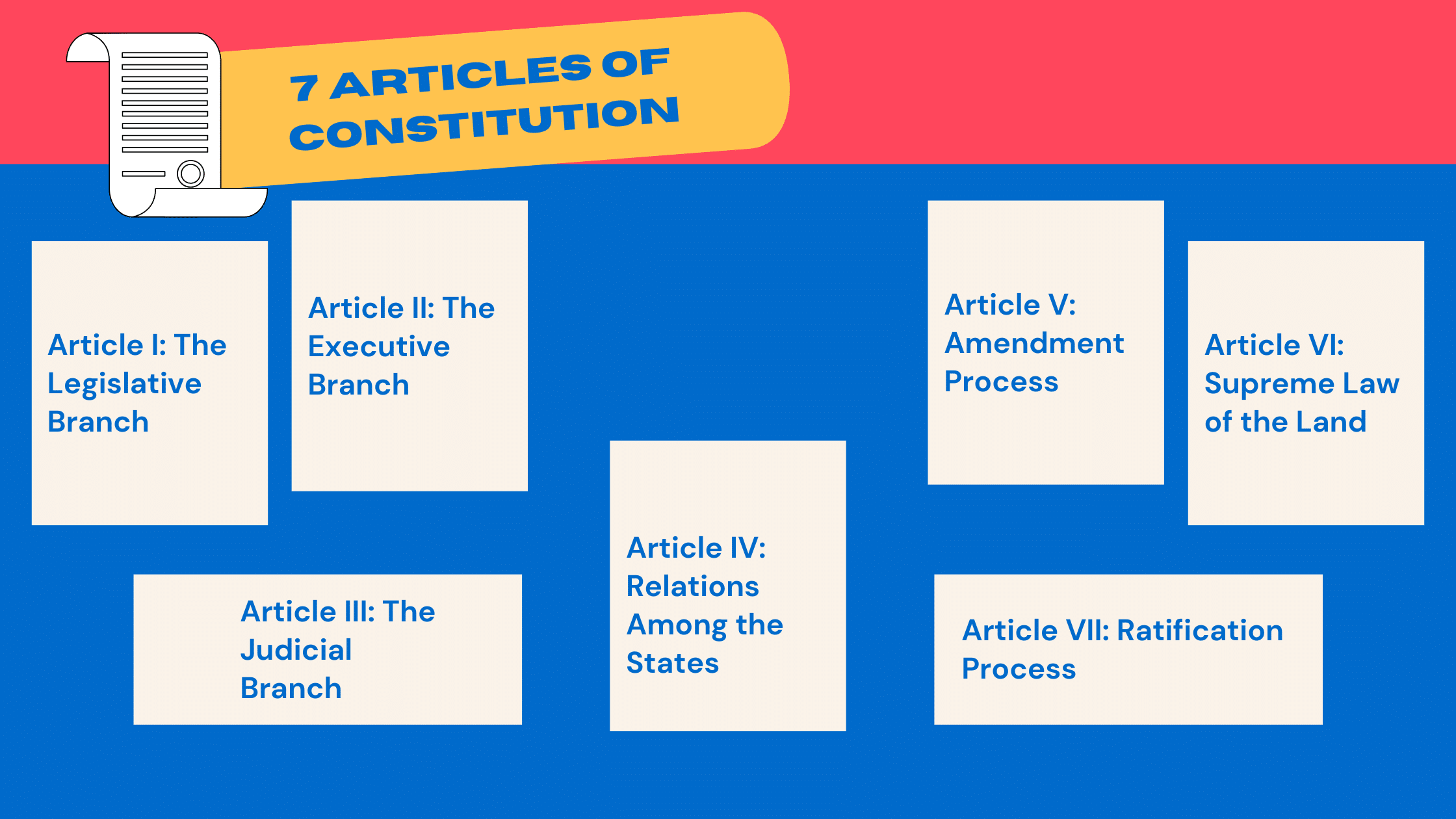
Here is an overview of what each of the seven articles covers. They were signed on September 17, 1787, and ratified on June 21, 1788.
| Article | Title | Summary |
|---|---|---|
| I | Legislative Branch | Establishes Congress as the law-making body of the federal government, consisting of the Senate and the House of Representatives. Outlines the powers and responsibilities of Congress. |
| II | Executive Branch | Establishes the presidency as the head of the executive branch of the federal government, with the power to enforce laws passed by Congress. Outlines the powers and responsibilities of the president. |
| III | Judicial Branch | Establishes the Supreme Court as the highest court in the land, with the power to interpret and apply the Constitution and federal law. Outlines the powers and responsibilities of the judiciary. |
| IV | States’ Relations | Outlines the relationships between the states and the federal government, including rules for admitting new states to the Union. |
| V | Amendment Process | Outlines the process for amending the Constitution, which requires the approval of two-thirds of Congress and three-fourths of the states. |
| VI | National Supremacy | Establishes the Constitution and federal laws as the supreme law of the land, and requires state judges to uphold them. |
| VII | Ratification | Outlines the process for ratifying the Constitution, which required the approval of nine of the thirteen states at the time. |
Article 1
Article I of the Constitution covers the legislative branch. The principal mission of this branch is to make laws. Congress is made up of the House of Representatives and the Senate.
Congress is the body that drafts and passes laws, borrows money for the United States, declares war, and raises a military.

Get Smarter on US News, History, and the Constitution
Join the thousands of fellow patriots who rely on our 5-minute newsletter to stay informed on the key events and trends that shaped our nation's past and continue to shape its present.
It also works by limiting and balancing the power of the other two federal branches that make up the government – the judicial and the executive branches.
Article 1 establishes that the Vice-President shall be the President of the Senate.
The first article was affected by the First Amendment, Fourth Amendment, Fifteenth Amendment, Nineteenth Amendment, and Twenty-Sixth Amendment.

Article 2
Article II explains the executive branch. This branch of government manages the daily operations of the government.
Article 2 outlines the process for electing the President and the Vice President.
Using various departments and agencies, such as the Department of the Treasury, the executive branch is probably one of the fastest-moving branches of the federal government.
While composed of multiple divisions, each department is headed by its secretary, who reports directly to the President of the United States.

Article 3
Article III reviews the judicial branch. The federal court system is part of the judicial branch. Article III states that the final court is the US Supreme Court.
Working with Congress, the United States Supreme Court can determine the size and scope of any courts below it.
All judges on this court are appointed for life unless they decide to resign or are charged with bad behavior. If a judge is impeached, they can only be removed in the wake of a trial and a two-thirds majority vote of the Senate.

Article 4
Article IV is about the rights and roles of the state government. The federal government guarantees a republic form of government in each state, protects the entire nation from violence, and determines how any new states can join the Union.
It also states that the states are equal and should have mutual respect for each other’s laws and any judicial decisions made by the state court systems.
Article IV outlines the states’ rights, the relationship between the federal government and the state governments, and the states’ interrelationships with one another.
The 13th Amendment made changes to Article 4 of the Constitution.
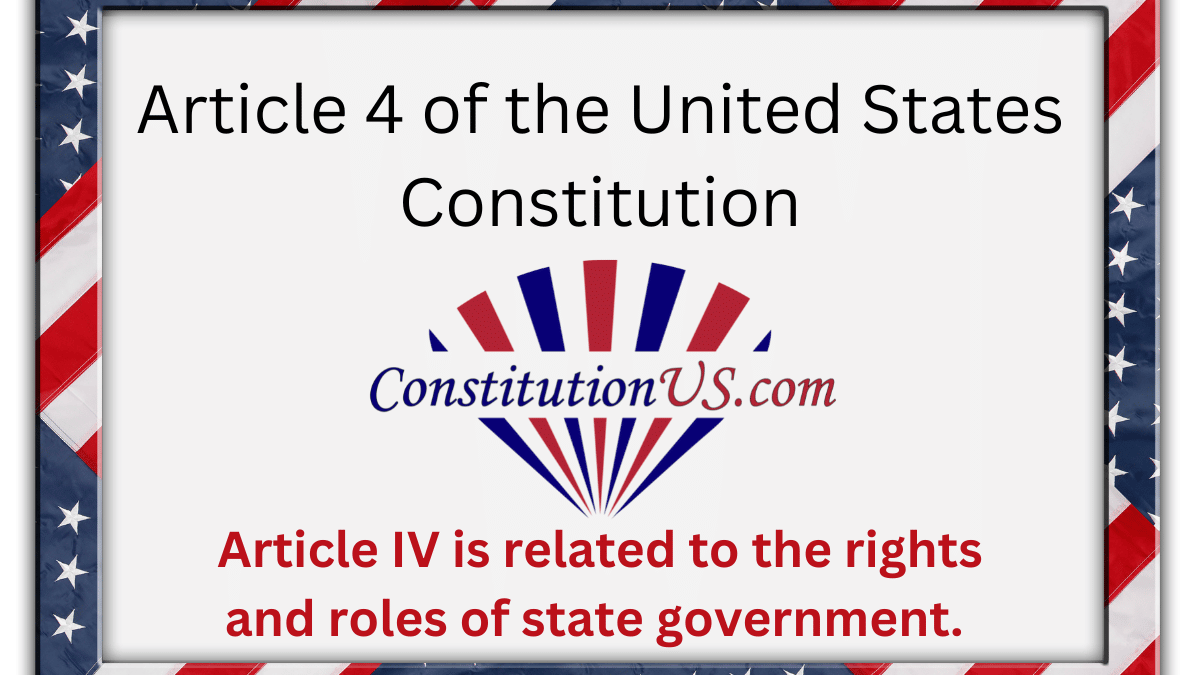
Article 5
Article V of the Constitution creates a mechanism for changes to the Constitution. While the Constitution can never be dissolved, it can be amended if it undergoes the amendment process.
The states and Congress can initiate the process of amending the United States Constitution. Since the Constitution was written, there have been multiple amendments made.
These amendments are usually warranted when problems or concerns develop that were not foreseen or addressed by the original Constitution.
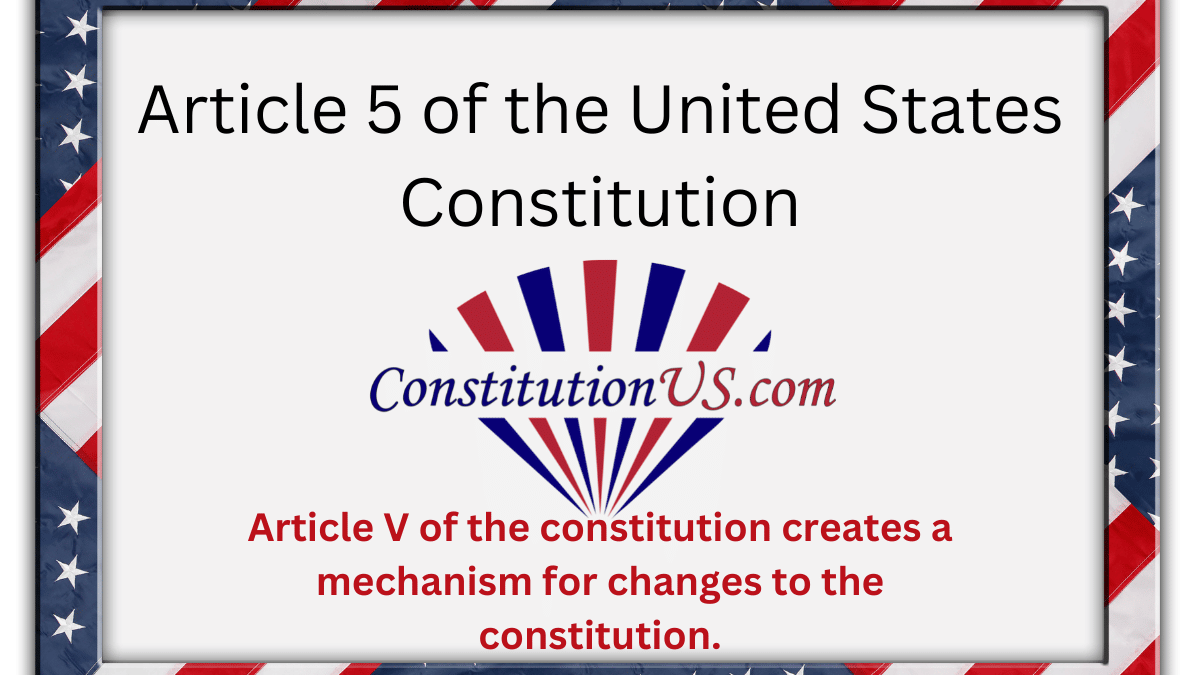
Article 6
Article VI reviews debts, supremacy, and oaths. The article states that the Constitution and all laws derived from it serve as the supreme law of the land.
All officials in the United States are required to swear an oath that they will uphold the Constitution.
This article is designed to ensure that the United States Constitution remains a document of high regard and is used to make the nation’s primary decisions.
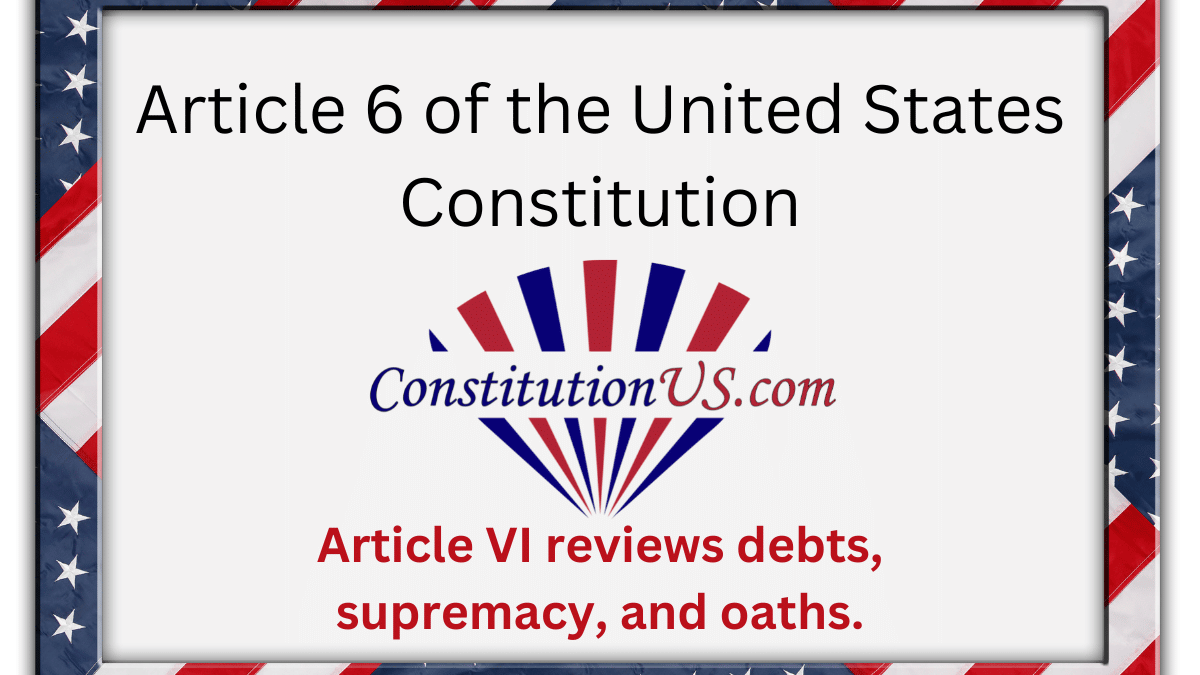
Article 7
Article VII specifies that only nine of the original 13 states were required to approve the document for ratification of the United States Constitution.
While the number of states has grown since the Constitution was signed, their signatures verify who signed the original document and that all interested parties witnessed it.
This does not guide the future of the national government but serves as a statement that the required number of colonies agreed upon it.
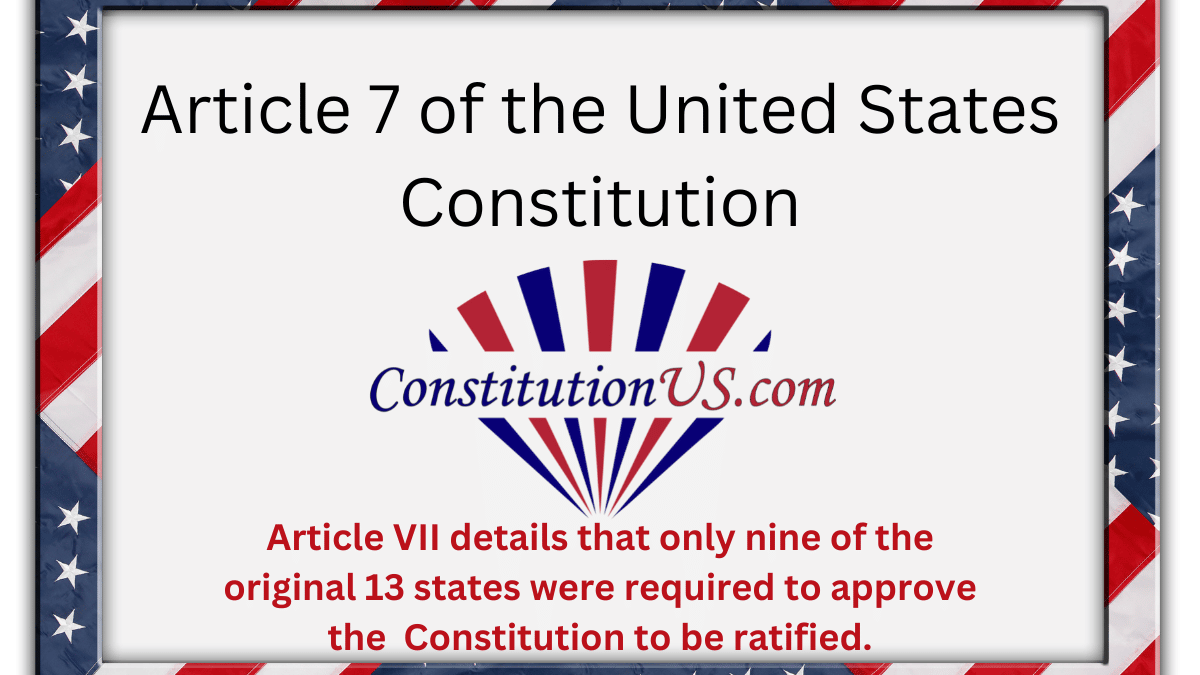
Understanding the Seven Articles of the US Constitution
These seven articles may appear fairly broad, but their function serves as a framework for the United States.
The constitution provides and limits power and outlines a system of checks and balances to avoid any branch having too much power. This is an important function and remains an active document today.
Famous Signatories of the United States Constitution
Famous signatories of the United States Constitution include:
- George Washington
- James Madison
- Benjamin Franklin
- Alexander Hamilton
- Gouverneur Morris.
Interestingly, Founding Fathers Thomas Jefferson and John Adams did not sign the Constitution. Both men were on diplomatic missions in Europe when the document was signed at the Constitutional Convention in Philadelphia.

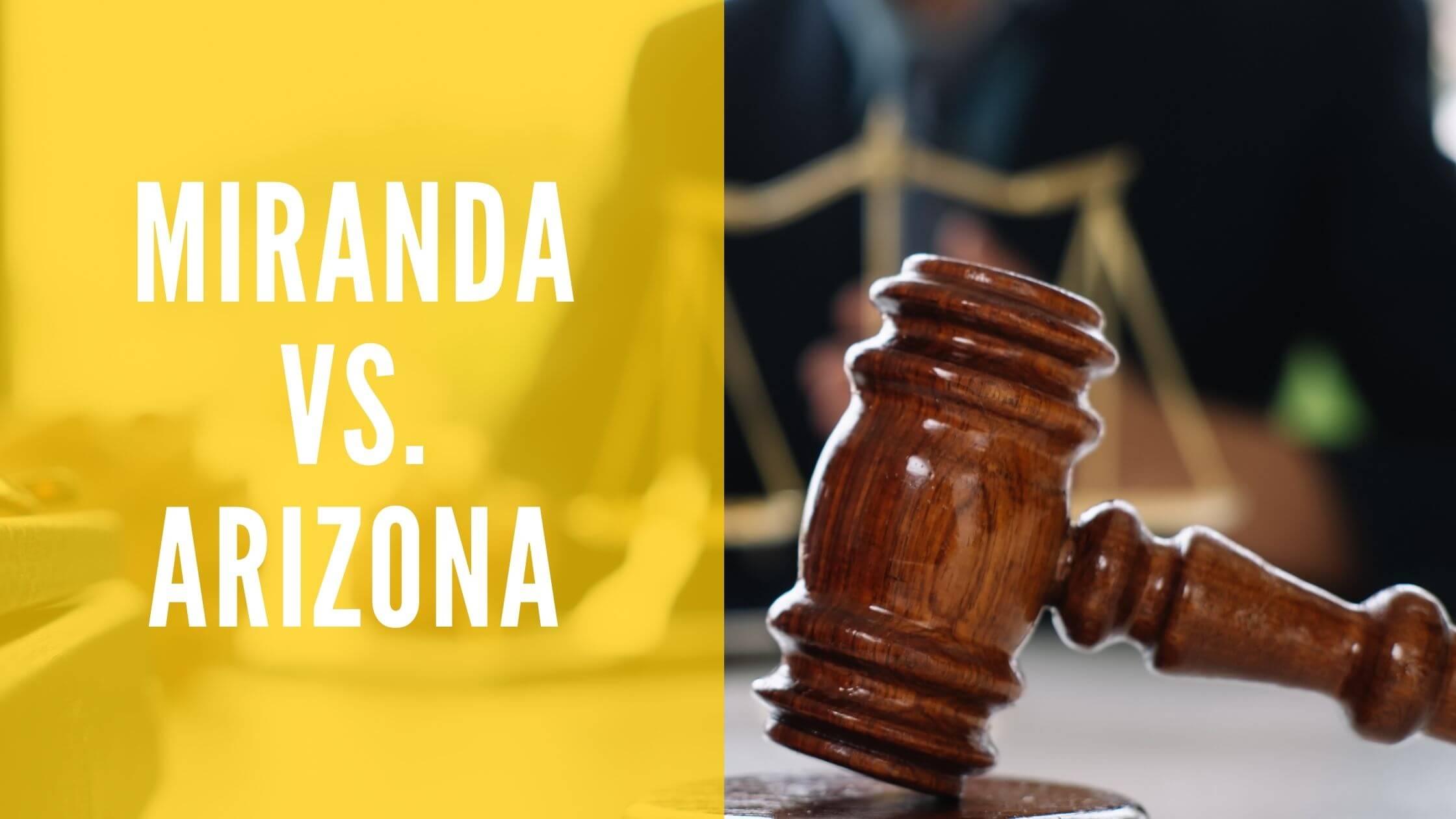








17 Responses
maybe someone can get this information to the congress they dont seem to know any of this valuable information . they must had taken their oathes in pig latin and did not understand it.
Yep, they have trashed the Constitution, especially one whole party. If the politicians obeyed it, our nation would heal and be a Constitutional Republic once again. Moreover, we may actually have a free society once again with prosperity.
Just curious: Which party is that, Glenn?
Snort snort…
Ii once handed a pocket Constitution to a United States Congressman and asked him to pass it on to Debbie Wasserman Schultz.
Have you watched the recent hearing for SCOTUS nominees? I don’t think the Judicial is much better.
on my ballot in NH there is a question I don’t understand. Are you in favor of ammending articles 71 and 81 of the constitution about county treasurers, county attorneys, sheriffs and registers of deeds elected? also, judges not to act as counsel? What does this all mean?
next question Shall there be a convention to ammend the constitution. Does there need to be a convention to change the gun laws? Right to have arms?
That’s regarding the NH STATE Constitution. Each state also has its own constitution.
Gina, that’s the State Constitution. You have the Constitution that established the United States and each State has their constitution. That was one of the first things that they taught us in Civics class my freshman year of high school. But, I was fortunate that my Grandfather taught me that when I was five and an ignorant hillbilly boy from West Virginia.
The question is changing your state constitution, not the constitution of the United States.
I am scared to say, a (don’t want to call what we have these days-‘judges.’ More like determiners. But one sitting on the highest court, in Washington, could not describe what the 2nd or 5th Article of the Constitution was about. Or, what the word ‘purposevism’ means.
Now they are being selected to sit on the highest court in the country. EMBARRASSING.
I just watched a recap of that on Fox News. I realize that stating it was on Fox News now makes whatever I say next suspect to some. Sad.
Really embarrassing. And Sad. For America and for that judicial candidate. But she should have known, much like a pilot should know what a certain cockpit switch is and does, a plumber should know the procedure to change out a toilet and a heart surgeon should know how to repair a heart. She is only being chosen by the Biden Administration because of what she is, not her level of competence. Really sad.
Speaking of the federal court nominees, if they can’t memorize the seven articles, how could they possibly remember ten commandments?
My ancestors came to the USA from Germany. They arrived here about 150 years ago. My surname family from Germany took a detour for about 4 generations through Russia…. Volga Germans .
Now in my mid 70’s I am witnessing the destruction of the USA by its own citizens. Our schools are no longer schools . They have become indoctrination centers. Teachers are deciding if a first grader should be a boy or a girl . The seeds of hate are being sown in every mind in our public schools.
A democratic republic can only exist and endure with a well informed voter population.
Well informed with facts , not propaganda.
Now I am not highly educated. I only spent 7 years in university education… Chemical Engineering and Electrical engineering. I graduated 50 years ago. About 35 years ago I thought learning Spanish would be a good idea. I studied for months in language schools in Mexico, and Ecuador. As well as university level courses here in USA. I am thinking now that I should have learned Chinese. My German is not too good . My Spanish is not too bad.
Our nation is in trouble. This fact should be recognizable by even the most casual observer. Ignorance is the foundation of destruction. “Woke” is the scepter of Satan.
Slavery and poverty for the masses, with power and control by the elite is the goal of the satan worshipers.
Our constitution is the only vehicle we have for survival. We should study it and live by it.
Glad I will be dead in a few years.
Article 5 of the Constitution allows a majority of states to call a
“Conference of States” which would override what is happening in Washington.
This is to protect the Federation of States from being overwritten by an overly powerful
centralized government located in Washington.
The founding fathers foresaw that a centralized government would probably want to
continually consolidate their powers over the union and this is what has happened.
We need to peel back the powers which have been established in Washington and
restore the powers of the States.
It is evident that one of the two major US political parties has distain for our US Constitution.
The House and Senate have BEEN too Partisan for over 100 years! They DO NOT work for America and her Citizens, Senators and Representatives are on the DOLE and do not honor their office. BTW elections aren’t solving the issues. Most of these people shouldn’t be allowed to push a broom. We need TERM LIMITS BADLY, and NO LIFE TIME RETIREMENTS after leaving the office.
I wonder if you had the same thoughts during Bret Kavanaugh’s questioning. There is no law student past the 1L stage who doesn’t know what purposivism is, however interpreting laws based on its original purpose is and can be limiting, an regressive which is why clarification was asked for. To believe that a judge, a graduate of Havard Law was chosen as a DEI candidate, and not because she had the pedigree, is a peculiar sickness in this country. Our current president cant name all 50 states. Hes put fox news achors in pivotal governmental positions, he who was a C student his entire life and had to be transferred from school to school because of behavior issues. You accept mediocrity so readily as long as its coated in pale skin. The justice you spoke of was on Harvard law review, and yet somehow you question her abilities based on a soundbite from fox news. Thats why we have an immigrant running our country, behind a felon with no morals, and a bunch of teenage tech nerds in charge of our medicaid and medicare. but at least their the right color.